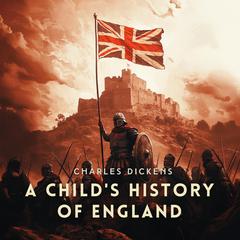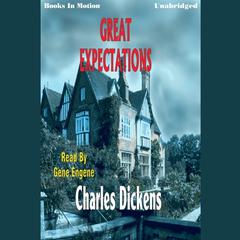 Play Audiobook Sample
Play Audiobook Sample
Barnaby Rudge Audiobook
 Play Audiobook Sample
Play Audiobook Sample
Quick Stats About this Audiobook
Total Audiobook Chapters:
Longest Chapter Length:
Shortest Chapter Length:
Average Chapter Length:
Audiobooks by this Author:
Publisher Description
Dickens' first historical novel is set in 1780s England at the time of the Gordon Riots. In a case of mistaken identity, Barnaby Rudge—a pale half-wit with long red hair who dresses all in green and carries a large raven on his back—is arrested as the leader of a mob of anti-Catholic rioters. He is condemned to death on the gallows, but an upright locksmith named Gabriel Varden comes to his aid.
Set beneath the cloud of an unsolved murder, this classic tale of treachery and forbidden love is often overlooked by present-day readers. Nevertheless, Dickens provides another memorable cast of characters, including the dull-witted, tyrannical John Willet, Dennis the Hangman, and Hugh the savage ostler.
Download and start listening now!
"I had never heard of this Dickens novel until now. What a fantastic read! Not knowing anything about it meant I approached it with a fresh mind and no spoilers (unlike my experience reading 'Old Curiosity Shop' where I always knew about Little Nell). From the start I was gripped. Who was this mysterious murderous man who threatened people left, right & centre? Why was there this feud between two families? Is that a ghost or a real person in the churchyard? Who are the parents of this character? Will that smug so-and-so ever get their comeuppance? Characters that initially look evil turn out to be good and vice versa. I also love reading historical novels based on real events - in this case, the 1780 Gordon Riots in London. I was also impressed that Dickens attempted to use as a main character somebody with 'learning difficulties' (to use contemporary phrase) in a sympathetic way. Finally I love the way Dickens can coin a phrase or describe things in a vivid and original way. One example I remember is when a family climb into a carriage. Instead of mentioning the individuals, Dickens describes the noise the carriage makes and you work out who it is for yourself."
— AJW (5 out of 5 stars)
Quotes
-
“Reader [Simon Vance] is an absolute joy, making this long and complex work accessible and entertaining. [Vance] distinguishes with charm and consistency among the huge cast of characters…Clearly [Vance] enjoys reading this novel as much as we enjoy listening to it.”
— AudioFile -
“The challenge [Dickens] presents to the narrator, with his bounteous prose and talkative eccentrics, is met resourcefully by Britisher [Simon Vance], whose unflagging energy, imagination, and finesse rank this among the best of audio Dickens.”
— Library Journal
Barnaby Rudge Listener Reviews
-
" This Dickens tale concerns the riots of 1780 in London. I think the author did an excellent job of building a fiction off of the facts. His characters were well developed, and the parts of the book that dealt with the actual riots were quite suspenseful. It is a very dramatic story, and worth a read both for historical information and for its merits as a good fiction. "
— Melodee, 2/10/2014 -
" What fun. Simon Tappertit was a hoot, as was the family he worked for. Some of the initial promise didn't quite hold up, both in characters and plot, I'd say. Barnaby was saved, but it was rather anti-climactic; Tappertit, Grip, and Scragg were each wonderful when they first came in, but, like Tappertit's legs, didn't get displayed to best advantage later on. But on the whole I enjoyed it very much. The Gordon Riots were remarkable-- glad to be introduced to them. "
— Alexander, 2/9/2014 -
" I keep thinking of this book and also its illustrations. "
— Jay, 2/6/2014 -
" I did not enjoy this novel nearly as much as Dickens' later darker novels, or even the earlier Oliver Twist, David Copperfield, or Nicholas Nickleby. If you are going to tackle Dickens, try those three first and then move on to Bleak House, Little Dorrit, and Our Mutual Friend. Much more interesting. "
— Elaine, 1/31/2014 -
" This is an historical fiction about a part of history (the Gordon Riots) I knew very little about. This one lost me a little in the middle but the first 1/3 and last 1/3 were hard for me to put down. "
— Janice, 1/29/2014 -
" It took me some time to get into this story, but I am glad I stuck with it. It picks up about halfway in, and then I could hardly put the book down. The vivid descriptions of the Gordon Riots are amazing -- worth the whole book by themselves, but I did come to care about the characters, as well, especially poor Barnaby. "
— Alice, 1/28/2014 -
" A plod and the women are awful. "
— Adrian, 1/26/2014 -
" All time fave dickens, dark, true and dramatic, for those who love the grungy side of life! "
— Danica, 1/21/2014 -
" It's easy to see why Barnaby Rudge is one of Dickens's less popular novels. It's overlong and overplotted, and it's awkwardly structured, falling too neatly into two halves. The first half centers on the frustrated love of Joe Willet for Dolly Varden, and the equally but differently frustrated love of Edward Chester and Emma Haredale, and on the murder of Emma's father. The second half focuses on the anti-Catholic Gordon riots of 1780. The two halves are knit together by the effects of the riots on the Willets, Vardens, Chesters and Haredales, and on the title character, the "idiot" Barnaby. But the characters -- especially Joe, Edward and Emma -- are such feeble stock figures, such conventionally drawn vessels of virtue, that it's hard to get emotionally involved with their fates. Moreover, even the "Dickensian" grotesques, such as Sim Tappertit (a name that elicits snickers from 12-year-old boys of all ages and sexes) and Miggs, are only fitfully amusing, and they quickly wear out their welcome. The one almost successful character in the novel is Hugh, the mysterious thug who may be the closest thing Dickens ever came to a tragic figure. He enters the novel as an enigmatic and almost attractive figure -- a wild man of sorts -- and descends into villainy during the riots. But at the end, he attains a kind of tragic awareness, which he expresses in his speech before he goes to the gallows. Dolly Varden, who became the novel's most popular character, even to the extent of causing a fashion craze later in the nineteenth century, is one of Dickens's better ingenues -- which is, to be sure, not saying much, since the Dickensian ingenue is typified by the saintly Agnes of David Copperfield. But by using Dolly's flighty mother and the jealous Miggs as foils, Dickens gives her some substance, allowing her to make foolish mistakes while enhancing her attractiveness. The treatment of the riots shows Dickens's gift for the sensational, culminating in the orgiastic revel at the vintner's house, when the mob immolates itself in a fiery, drunken stupor, a fatal bacchanal of sorts. But the vividness of the riot scenes contrasts too sharply with the insipidity of the novel's lovers, who settle down at the book's end into a complacent rural fertility, producing hordes of cherubic little Joes and Dollys. The chief flaw of the novel, however, is Barnaby himself, who resembles no mentally challenged person ever encountered in this world. He is a vehicle for pathos, a holy fool who goes astray, but he grows so annoying in this role that it's hard to care whether he's rescued from the gallows. And if you don't care about that, it's hard to care about anything that Dickens wants you to care about. Still, the novel is distinguished by Dickens's passion for justice and his contempt for hypocrisy. At its best moments, they give it a spine of conviction that keeps it from collapsing into a welter of melodrama. For American readers, the oddest thing about the novel may be its time frame: The action takes place between 1775 and 1780, when the American War for Independence was taking place. Yet the only reference to this conflict, which surely must have preoccupied Britons even more than the Gordon riots, is in Joe's loss of an arm at the siege of Savannah, which takes place offstage from the novel's main action -- and in the chronicles of the Revolutionary War is for many people almost a footnote. Was Dickens, who was preparing for his trip to America while the novel was appearing, afraid of alienating American readers by bringing that conflict to the fore in his narrative? "
— Charles, 1/15/2014 -
" I wanted to read Dickens, but I just found them too hard to get into. This is perfect for a first Dickens, it flows from the start, lovely descriptive writing, must visit the pub in Chigwell, (now an Indian Restaraunt). Something for everyone in this book, read it. "
— eric, 1/13/2014 -
" Interesting historical fiction about the 1780 Gordon Riots. Not Dickens' best historical fiction, but mildly amusing with some memorable characters. "
— Jeri, 1/10/2014 -
" What a wonderful book. Insightful, funny, sad, profane. "
— Mikee, 1/6/2014 -
" It's too draggy I can't finish it. Will leave it for a while. "
— Ayu, 1/5/2014 -
" I wanted to read Dickens, but I just found them too hard to get into. This is perfect for a first Dickens, it flows from the start, lovely descriptive writing, must visit the pub in Chigwell, (now an Indian Restaraunt). Something for everyone in this book, read it. "
— eric, 1/1/2014 -
" going for a classic! "
— Marie, 12/7/2013 -
" This book has everything - murder, romance, riots, humor, drama. I didn't know much about this book before reading it, so my expectations were low. I really enjoyed the characters and will remember some if them fondly. Am I the only one who liked Hugh, in spite if myself? "
— Stacy, 11/27/2013 -
" I enjoyed this book very much. I didn't fall in love with it as much as with some of Dickens' other books, but like all his work it was full of tragedy, comedy and colorful characters. Definitely recommended. "
— Misha, 11/22/2013 -
" This Dickens historical novel was an unexpected pleasure, and its tale of religious fanaticism in 1780 England is surprisingly apt for our time. Also interesting to see the model for Poe's "The Raven." The descriptions of the riots, with their attendant horrors and outrages, are unforgettable. "
— Bruce, 11/19/2013 -
" Poor soul---Barnaby!!! "
— Akandwanaho, 11/15/2013 -
" A sometimes overlooked Dickens classic. The description of the Gordon riots is a remarkable piece of writing. "
— Darrenl, 10/31/2013 -
" This is an historical fiction about a part of history (the Gordon Riots) I knew very little about. This one lost me a little in the middle but the first 1/3 and last 1/3 were hard for me to put down. "
— Janice, 9/27/2013 -
" This was my last Dickens novel to read and I was sort of sad to let it go. It stands as strong as any of them. On to the Christmas stories, travel essays, and starting back again with Oliver Twist and Great Expectations. "
— Christina, 9/21/2013 -
" This was a BBC production of Dickens book. Subject and story were awful. Perhaps it was the acting. "
— Ange, 9/16/2013 -
" interesting picture of gordon riots, with dickens usual grotesques "
— Keith, 8/29/2013 -
" This Dickens historical novel was an unexpected pleasure, and its tale of religious fanaticism in 1780 England is surprisingly apt for our time. Also interesting to see the model for Poe's "The Raven." The descriptions of the riots, with their attendant horrors and outrages, are unforgettable. "
— Bruce, 7/26/2013 -
" A very interesting but confusing book. Dickens introduces many characters in this story. But somehow they all get lost. The plots are many and confusing and I am not sure of the story line, even after I read the book. "
— Tom, 7/8/2013 -
" interesting picture of gordon riots, with dickens usual grotesques "
— Keith, 5/1/2013 -
" Perhaps strangely Barnaby Rudge is not the real hero of this novel. A complex plot invoving murder and the social unrest of the Gordon Riots in 1780 London. His depiction of the mob running amok in a frenzy of sectarian hatred has a modern resonance. "
— Mick, 4/13/2013 -
" This is my favorite of all the Dickens books. I don't know why, but I read it in 9th grade, and it haunted me like no other book of its kind. I have reread it two times since, and I still feel this way. And it amazes me that no one ever mentions this book when talking about Dickens. That baffles me. "
— Jason, 11/30/2012 -
" Very well written, but extremely disturbing. Read at the same time as Zola's Germinal. Both deal with riots and unrest. "
— Perlie, 11/4/2012 -
" So full of humor and wit. I'm reading it again and enjoying it more than the first time. How did Dickens gain such a wonderful command of the language to paint such detailed pictures. "
— Julie, 3/16/2012 -
" A very long saga of war in England. The characters got rather confusing at times. "
— Vickie, 1/16/2012 -
" Excellent and timely. Dickens was a great storyteller. "
— Lorie, 10/20/2011 -
" A little slow at times but still a good book. "
— Lili, 8/10/2011 -
" A very long saga of war in England. The characters got rather confusing at times. "
— Vickie, 4/27/2011 -
" I should learn my lesson and read this one chapter at a time, like his readers did. Will try it with the next book. "
— astrangerhere, 3/4/2011 -
" I should learn my lesson and read this one chapter at a time, like his readers did. Will try it with the next book. "
— astrangerhere, 3/4/2011 -
" I should learn my lesson and read this one chapter at a time, like his readers did. Will try it with the next book. "
— astrangerhere, 3/4/2011 -
" Not terribly interesting. Hard to feel anything for the protagonists. Dickens was a master but not every book is a gem. "
— Albert, 2/1/2011 -
" Not terribly interesting. Hard to feel anything for the protagonists. Dickens was a master but not every book is a gem. "
— Albert, 2/1/2011 -
" Not terribly interesting. Hard to feel anything for the protagonists. Dickens was a master but not every book is a gem. "
— Albert, 2/1/2011 -
" There has never been a riot committed to paper like Dickens manages here - the riots of '80! "
— Andrew, 1/1/2011 -
" There has never been a riot committed to paper like Dickens manages here - the riots of '80! "
— Andrew, 1/1/2011 -
" There has never been a riot committed to paper like Dickens manages here - the riots of '80! "
— Andrew, 1/1/2011 -
" A sometimes overlooked Dickens classic. The description of the Gordon riots is a remarkable piece of writing. "
— Darrenl, 12/10/2010 -
" A sometimes overlooked Dickens classic. The description of the Gordon riots is a remarkable piece of writing. "
— Darrenl, 12/10/2010 -
" A sometimes overlooked Dickens classic. The description of the Gordon riots is a remarkable piece of writing. "
— Darrenl, 12/10/2010 -
" Discovered an episode of English history of which I was ignorant, interesting story which kept me reading. "
— Deanne, 11/19/2010 -
" Discovered an episode of English history of which I was ignorant, interesting story which kept me reading. "
— Deanne, 11/19/2010 -
" Discovered an episode of English history of which I was ignorant, interesting story which kept me reading. "
— Deanne, 11/19/2010 -
" Excellent and timely. Dickens was a great storyteller. "
— Lorie, 9/5/2010 -
" Excellent and timely. Dickens was a great storyteller. "
— Lorie, 9/5/2010 -
" Excellent and timely. Dickens was a great storyteller. "
— Lorie, 9/5/2010
About Charles Dickens
Charles Dickens (1812–1870) was born in Landport, Portsmouth, England, the second of eight children in a family continually plagued by debt. A legacy brought release from the nightmare of debtors’ prison and child labor and afforded him a few years of formal schooling. He worked as an attorney’s clerk and newspaper reporter until his early writings brought him the amazing success that was to be his for the remainder of his life. He was the most popular English novelist of the Victorian era, and he remains popular, responsible for some of English literature’s most iconic characters.
About Simon Vance
Simon Vance (a.k.a. Robert Whitfield) is an award-winning actor and narrator. He has earned more than fifty Earphones Awards and won the prestigious Audie Award for best narration thirteen times. He was named Booklist’s very first Voice of Choice in 2008 and has been named an AudioFile Golden Voice as well as an AudioFile Best Voice of 2009. He has narrated more than eight hundred audiobooks over almost thirty years, beginning when he was a radio newsreader for the BBC in London. He is also an actor who has appeared on both stage and television.










































